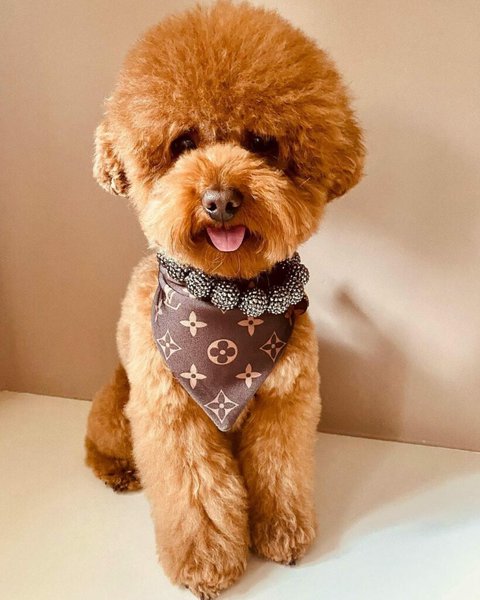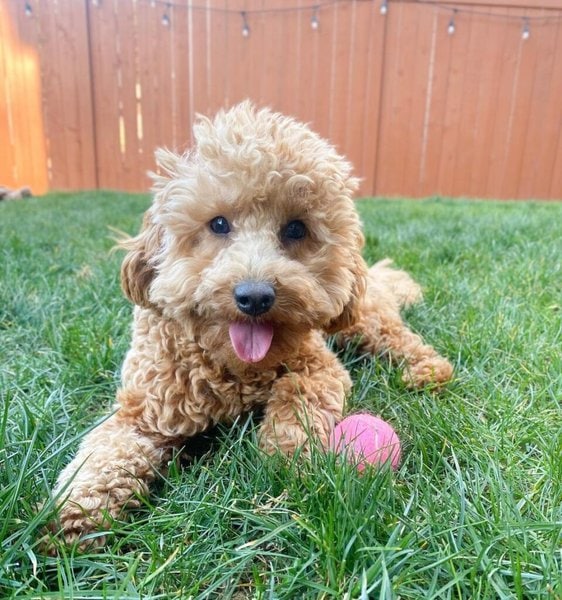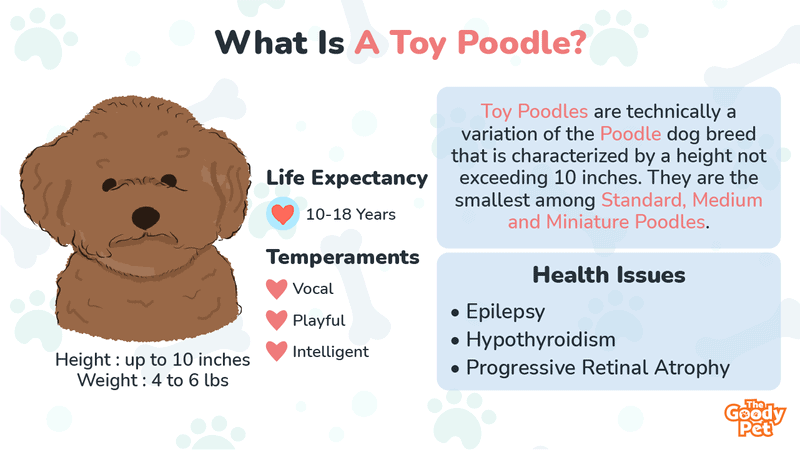Toy Poodles are a special breed as they combine the intelligence and confidence of a Standard poodle with the adorably compact build of toy dog breeds. It is no wonder they are so popular as family pets and for first-time dog owners.
Toy Poodles are technically a variation of the Poodle dog breed that is characterized by a height not exceeding 10 inches. They are the smallest They are the smallest among Standard, Medium, and Miniature Poodles. Contrary to popular belief, there is more than the size that differentiates Toy Poodles to the other varieties.
In the sections below, we shall take a closer look at some of the quirks of the Toy Poodle variety in terms of physical appearance, personality, and care needs. This should help give you a better idea of what to expect from these fluffy little doggies if you are considering getting one.
Let’s get things started by taking a look at how to tell a Toy Poodle apart from the other 2 varieties.
Is A Toy Poodle A Good First Dog?
A Toy Poodle is a fantastic first dog whether you want a companion for yourself or you are looking for a family pet. One thing that makes them such an awesome addition to any home is their compact build which makes them much easier to live with and to take care of.
This small build is one of the main differences between a Toy Poodle and variations like the Standard, or Miniature Poodles.
Here are more of these defining features that make the Toy Poodle a unique dog.
Size
On average, an adult Toy Poodle can weigh between 4 to 6 lbs and measure less than 10 inches in height. With these measurements in mind, it is easy to see why many dog owners and breeders sometimes use the term Teacup Poodle to refer to very small Toy Poodles.
Strictly speaking, Teacup Poodles are not a recognized variation of the Poodle dog breed. However, if you really want to make that distinction, the 5-pound mark is considered the cutoff between Toy and Teacup Poodles.
Therefore, any Poodle weighing less than 5 lbs as an adult should technically be referred to as a Teacup Poodle.
Proportions
The Toy Poodle has a bit of a more compact and proportional build than their often tall and lanky Standard and Miniature counterparts. This is mainly due to their small size and the fact that their thick coats give them a bit more bulk in terms of appearance than the larger varieties.
Coat Traits
The coat on a Toy Poodle is dense, tightly coiled, and has a coarse texture. The color variations are pretty much what you would find with any other Poodle. These include white, black, brown, blue, gray, silver, cream, red, and many other colors and patterns.

How Long Can A Toy Poodle Live?
Toy Poodles have an impressive lifespan of 10 to 18 years. For some perspective on just how long this is, Standard Poodles have a life expectancy ranging from about 12 to 15 years.
The long life span that Toy Poodles enjoy is largely due to their unproblematic genetics. Small dog breeds like this one also tend to live much longer than their larger counterparts.
While Toy Poodles can live for a very long time, they are not exempt from health problems. Here are some of the most common health problems that Toy Poodles have.
Progressive Retinal Atrophy
Progressive Retinal Atrophy is an irreversible condition that causes destruction of the Toy Poodle’s retinas. It affects both eyes and will eventually lose their sight. While greatly debilitating, early training should help your Toy Poodle adapt.
Hypothyroidism
Hypothyroidism in Toy Poodles occurs when the thyroid gland fails to produce enough thyroid hormones for different functions like regulating metabolism, skin health, and thermoregulation.
This may cause issues like hair loss, chronic fatigue, obesity, and many other signs and symptoms.
Epilepsy
Epilepsy is a common hereditary condition in Poodles and the Toy Poodle variety is not exempt from this condition. The seizures vary in intensity and triggers. However, with proper medication and care to avoid triggers, your Toy Poodle should live a relatively normal life.
Addison’s Disease
Addison’s Disease is another common hormonal imbalance disease that affects Toy Poodles. It is as a result of reduced activity of the adrenal glands which produce stress hormones like cortisol.
The low levels of these hormones result in a number of often vague symptoms and signs like reduced appetite, low energy levels, and vomiting.

How To Take Care Of Toy Poodles?
Another reason why Toy Poodles are awesome first time pets is the fact that they are very easy to maintain. Their small size means that they do not eat too much while their moderate energy levels make it very easy to keep up with their activity needs.
To help you take the best possible care of your dog, here is a quick summary of the most important care tips for your Toy Poodle.
Invest In High Quality And Balanced Meals
Toy Poodles are not as prone as other dog breeds to developing obesity. However, it is still a possibility which is why watching what and how much you feed your little pooch is so important.
Ideally, the diet should be balanced in such a way that most of the dog food includes proteins, healthy fats, and micronutrients like vitamins and minerals. It is also crucial to ensure that you get dog food made with high quality and real ingredients.
Pet Plate meets all these requirements and then some with their customized meal plans and recipes that use human-grade ingredients.
It also helps to invest in supplements to get your Toy Poodle any micronutrients or compounds that may be missing or inadequate in their diet.
Plan For About 1 Hour Of Exercise A Day
Toy Poodles have moderate energy levels and thus will be happy with 30 minutes to 1 hour of activity every day. However, they tend to be easily bored by repetitive tasks. So, find ways to switch things up whether it is choosing a new route or working with interactive dog toys.
Come Up With A Regular Grooming Schedule
Regular grooming is a huge part of taking good care of your Toy Poodle. It includes clipping their nails every 2 weeks, cleaning their ears to minimize the risk of ear infections, and ensuring dental hygiene.
With the dental hygiene part, investing in dental water additives for dogs is a quick, convenient, and effective way to get the job done.
Do Toy Poodles Bark A Lot? Temperaments Of Toy Poodles
A Toy Poodle’s personality traits are another set of characteristics that make this variation different from the Miniature and Standard Poodles. They tend to be a bit livelier and more social than the aloof Standard Poodle.
Here are a few more temperament traits that you have to look forward to.
Social
Toy Poodles thrive in environments where they are constantly around people. This makes them perfect for family setups especially when there is constant activity and human traffic within the home. Toy Poodles therefore do not like to be left alone.
However, it is important to remember that Toy Poodles can be a bit shy and scared to meet new people. The good news is that this is something you can easily solve by socializing the dog early.
Vocal
Toy Poodles are not the loudest of dogs nor are they the most incessant of barkers but they can be yappy when they want to. They will usually bark out of boredom or excitement.
Fortunately, Toy Poodles should have started calming down and getting quieter by the time they are 1 year old.
Intelligent And Obedient
Toy Poodles may seem goofier than Standard and Miniature Poodles but they are every bit as smart and obedient when it comes to training. They pick up quickly on commands whether it is potty training or even bark control training.
Playful
If you want a lively dog that you can keep up with, the Toy Poodle has the right amount of playfulness and would therefore be a great fit. Their playful nature is another reason why Toy Poodles are good as family dogs.

Are Toy Poodles High Maintenance? Grooming Tips For Toy Poodles
As if the adorable features and loveable personality were not enough, the Toy Poodle stands out as an awesome pet with its hypoallergenic coat. The tight curls minimize the amount of shedding which is the main reason for this perk.
The fur on Toy Poodles, as well as other Poodle varieties, also grows at a different rate from other dog breeds which also contributes to the minimal shedding.
Despite the low maintenance nature of a Toy Poodle’s coat, there is still work to be done to keep the coat healthy and beautiful. Here are a few tips that should come in handy.
Brush Your Toy Poodle 3 Times A Week Or More
This may come as a bit of a surprise but Toy Poodles still need regular brushing despite being hypoallergenic and shedding minimally. The brushing here is meant to help detangle the coils and prevent matting.
We recommend you use the Furminator Undercoat Tool which is not only easy to use on thick coats like a Toy Poodle’s but also easy to clean.
Wash Your Toy Poodle Every 4 To 6 Weeks
Toy Poodles do not smell and are awesome if you don’t want a stinky pooch. However, they are prone to skin issues whether due to hormonal imbalances or allergies. Regular baths are thus crucial in ensuring coat health for the dog.
An interval of 4 to 6 weeks is ideal for Toy Poodles.
Your choice of grooming products also makes the world of a difference. We recommend Mighty Petz 2-In-1 Oatmeal Dog Shampoo And Conditioner. The use of oatmeal makes it particularly good for Toy Poodles with sensitive and/or compromised skin as it has soothing and restorative properties.
Related Questions
How Much Does Toy Poodle Cost? A Toy Poodle on average costs $1,000 to $1,500. However, they can go for as much as $2,200 depending on their lineage and the breeder’s policies. While this is a high price for a Toy dog breed, Toy Poodles are significantly more affordable than Standard Poodles as the latter can cost $5,000 each or even more.
Can Toy Poodles Climb Stairs? Toy Poodles should be able to climb stairs if they have healthy joints and are adequately trained. With these conditions, it is best to invest in stairs barriers until you are confident in their abilities. For Toy Poodles predisposed with joint issues like patellar luxation, even training may not be enough to help them safely get up and down stairs.
Do Toy Poodles Like To Swim? Poodles love swimming and are among the dog breeds that are naturally good at it. Everything from their coats to the structure of their paws makes swimming very easy and fun for them. The history of Poodles being used as water retrieval dogs also makes them instinctively comfortable in large bodies of water.





